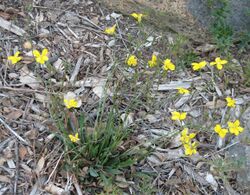Biology:Goodenia lineata
| Grampians goodenia | |
|---|---|

| |
| Goodenia lineata in the Royal Botanic Gardens, Melbourne | |
| Scientific classification | |
| Kingdom: | Plantae |
| Clade: | Tracheophytes |
| Clade: | Angiosperms |
| Clade: | Eudicots |
| Clade: | Asterids |
| Order: | Asterales |
| Family: | Goodeniaceae |
| Genus: | Goodenia |
| Species: | G. lineata
|
| Binomial name | |
| Goodenia lineata J.H.Willis[1]
| |
Goodenia lineata, commonly known as Grampians goodenia,[2] is a species of flowering plant in the family Goodeniaceae and is endemic to the Grampians in Victoria, Australia. It is an erect perennial herb with lance-shaped, more or less toothed leaves with the narrower end towards the base and racemes of yellow flowers.
Description
Goodenia lineata is an erect perennial herb that typically grows to a height of up to 50 cm (20 in). The leaves are lance-shaped with the narrower end towards the base, 30–80 mm (1.2–3.1 in) long and 3–9 mm (0.12–0.35 in) wide, with more or less toothed edges and mostly arranged at the base of the plant. The flowers are arranged small numbers in racemes up to 200 mm (7.9 in) long on a peduncle 40–80 mm (1.6–3.1 in) long. Each flower is on a pedicel 40–80 mm (1.6–3.1 in) long and there are linear bracts 3–9 mm (0.12–0.35 in) long and triangular bracteoles 3–4 mm (0.12–0.16 in) long. The sepals are lance-shaped, 4–7 mm (0.16–0.28 in) long and the corolla is yellow and about 20 mm (0.79 in) long. The lower lobes of the corolla are 8–10 mm (0.31–0.39 in) long with wings about 2 mm (0.079 in) wide. Flowering mainly occurs from November to February but fruit and seeds have not been recorded.[2][3]
Taxonomy
Goodenia lineata was first formally described by botanist Jim Willis in 1967 in the journal Muelleria. The type specimen was collected by Willis at the summit of Mount William.[4][5] The specific epithet (lineata) means "marked with straight lines", referring to "the boldly striped lower half of the corolla".[5][6]
Distribution and habitat
Grampians goodenia grows in heath and is restricted to the Grampians of Victoria.[3]
Conservation status
The species is listed as "rare" by the Victorian State Wide Integrated Flora and Fauna Teams (SWIFFT).[7]
References
- ↑ "Goodenia lineata". Australian Plant Census. https://biodiversity.org.au/nsl/services/apc-format/display/74565.
- ↑ 2.0 2.1 Jeanes, Jeff A.. "Goodenia lineata". Royal botanic Gardens, Victoria. https://vicflora.rbg.vic.gov.au/flora/taxon/bd347531-bcb4-443d-a178-85919e0f0d03.
- ↑ 3.0 3.1 Carolin, Roger C.. "Goodenia leptoclada". Australian Biological Resources Study, Department of Agriculture, Water and the Environment: Canberra. https://profiles.ala.org.au/opus/foa/profile/Goodenia%20lineata.
- ↑ "Goodenia lineata". APNI. http://id.biodiversity.org.au/instance/apni/487194. Retrieved 3 March 2021.
- ↑ 5.0 5.1 Willis, James H. (1967). "Systematic Notes on the Indigenous Australian Flora". Muelleria 1 (3): 151–152. https://www.rbg.vic.gov.au/documents/Muelleria_1(3),_pp117-163_Willis_(Part_2).pdf. Retrieved 3 March 2021.
- ↑ Sharr, Francis Aubi; George, Alex (2019). Western Australian Plant Names and Their Meanings (3rd ed.). Kardinya, WA: Four Gables Press. p. 241. ISBN 9780958034180.
- ↑ "Threatened flora Northern Grampians Shire". State Government of Victoria, Department of Land, Water and Planning. https://www.swifft.net.au/cb_pages/threatened_flora_northern_grampians_shire.php.
Wikidata ☰ Q5583344 entry
 |

